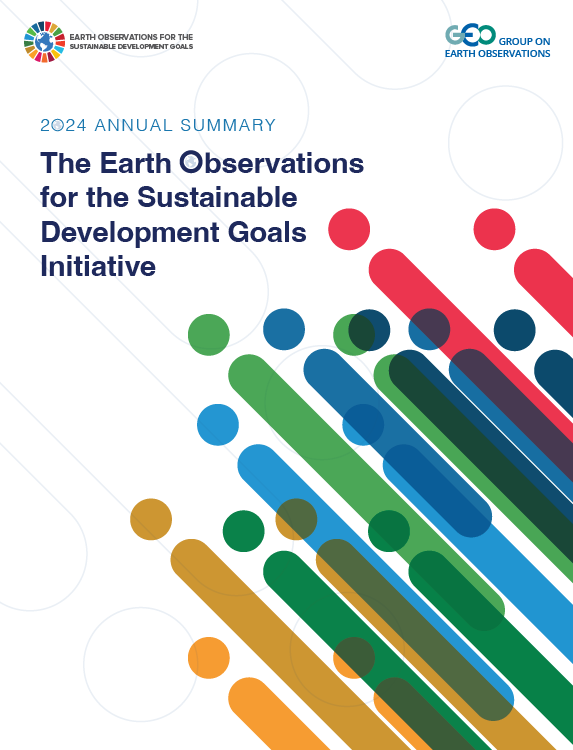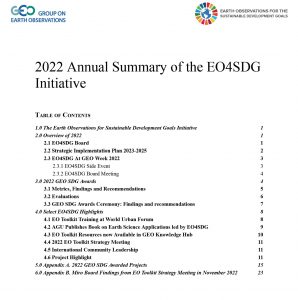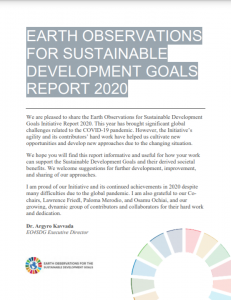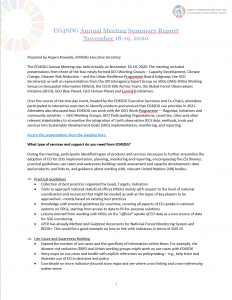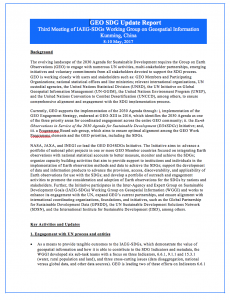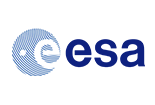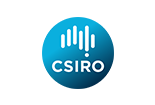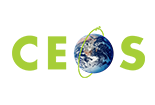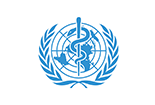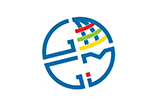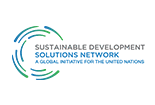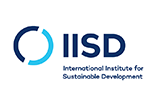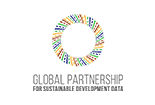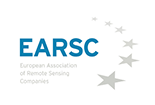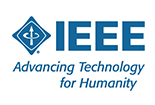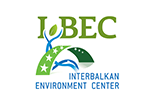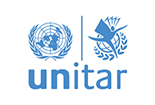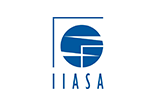2024
Read our Annual Summary Report here:
2024 introduced a number of new organizations to the Initiative, and many opportunities for us to showcase our work to new regions. We made our entry into the realm of science education, and expanded our digital presence by joining Instagram. The EO4SDG community also envisioned how collaboration for SDG progress should continue within GEO for 2026 and beyond. Read on to see more about the impact of our activities to engage and expand the Initiative!
2023
Read our Annual Summary Report here:
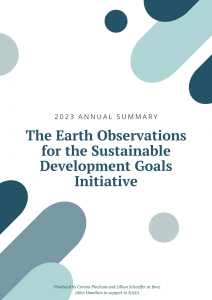 We are pleased to share this overview of EO4SDG’s 2023 achievements with our growing community. At GEO Week 2023 we celebrated our 5th year of conducting the GEO SDG Awards Program and held a side event on adopting Earth observations data for SDG advancement. We began a new blog series “Mapping Progress: EO and the SDGs”, welcoming writing contributions from experts in our community. A new Featured Project on research for SDG 6 was also published on the website, and we held a session at AGU 2023 on quantitative SDG indicator assessment methods. Read the full report to learn more about these activities!
We are pleased to share this overview of EO4SDG’s 2023 achievements with our growing community. At GEO Week 2023 we celebrated our 5th year of conducting the GEO SDG Awards Program and held a side event on adopting Earth observations data for SDG advancement. We began a new blog series “Mapping Progress: EO and the SDGs”, welcoming writing contributions from experts in our community. A new Featured Project on research for SDG 6 was also published on the website, and we held a session at AGU 2023 on quantitative SDG indicator assessment methods. Read the full report to learn more about these activities!
2022
Read our Annual Summary Report here:
In 2022, EO4SDG continued to build awareness about the benefits of using Earth observations to inform the Sustainable Development Goals (SDGs). We formed our inaugural Board, created a strategic implementation plan for 2023-2025, and held a side event at GEO Week 2022 on “The Impact of Earth Observations for the 2030 Agenda.” We also conducted the annual GEO SDG Awards Program, continued to update and promote the Earth Observations Toolkit for Sustainable Cities and Human Settlement, and contributed to numerous working groups and publications. Read our full 2022 Annual Report for more updates!
2021
Read our Annual Summary Report here:
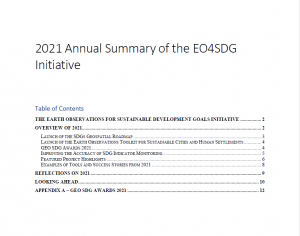 In 2021, EO4SDG members worked to identify and share best practices regarding: use of Earth science data and applications to achieve the SDGs; data discovery, access, and utilization; capacity development; and communications and outreach. The initiative collaborated with GEO on various activities (e.g., GEO Human Planet, Global Urban Observations and Information [GUOI]) and with other partners (e.g., UN Habitat, World Bank, Esri, Google) to strengthen linkages with stakeholders. EO4SDG also supported open data access and the development of methods, tools, use cases, and capacity-development activities and participated in and led sessions at numerous domestic and international conferences, events, and expert team meetings to raise awareness and showcase the importance of using Earth observations and derived knowledge to achieve the SDGs.
In 2021, EO4SDG members worked to identify and share best practices regarding: use of Earth science data and applications to achieve the SDGs; data discovery, access, and utilization; capacity development; and communications and outreach. The initiative collaborated with GEO on various activities (e.g., GEO Human Planet, Global Urban Observations and Information [GUOI]) and with other partners (e.g., UN Habitat, World Bank, Esri, Google) to strengthen linkages with stakeholders. EO4SDG also supported open data access and the development of methods, tools, use cases, and capacity-development activities and participated in and led sessions at numerous domestic and international conferences, events, and expert team meetings to raise awareness and showcase the importance of using Earth observations and derived knowledge to achieve the SDGs.
2020
Read our Progress Report here:
We are pleased to share the Earth Observations for Sustainable Development Goals Initiative Report 2020. This year has brought significant global challenges related to the COVID-19 pandemic. However, the Initiative’s agility and its contributors’ hard work have helped us cultivate new opportunities and develop new approaches due to the changing situation.
We hope you will find this report informative and useful for how your work can support the Sustainable Development Goals and their derived societal benefits. We welcome suggestions for further development, improvement, and sharing of our approaches.
Read our Annual Meeting Summary Report here:
The EO4SDG Annual Meeting was held virtually on November 18-19, 2020. The meeting included presentations from three of the four newly formed GEO Working Groups – Capacity Development, Climate Change, Disaster Risk Reduction – and the Urban Resilience Programme Board Subgroup; the GEO Secretariat; as well as representatives from the UN Interagency Expert Group on SDGs (IAEG-SDGs) Working Group on Geospatial Information (WGGI), the CEOS SDG Ad Hoc Team, the Global Forest Observations Initiative (GFOI), GEO Blue Planet, GEO Human Planet and EuroGEO initiatives.
Over the course of the two-day event, headed by the EO4SDG Executive Secretary and Co-Chairs, attendees participated in interactive exercises to identify products and services that EO4SDG can prioritize in 2021. Attendees also discussed how EO4SDG can work with the GEO Work Programme — flagships, initiatives and community activities — GEO Working Groups, GEO Participating Organizations, countries, cities and other relevant stakeholders to streamline the integration of Earth observation (EO) data, methods, tools and services into Sustainable Development Goals (SDG) implementation, monitoring, and reporting.
Access the presentations from the meeting here.
2018
Read our August 2018 Progress Report here:
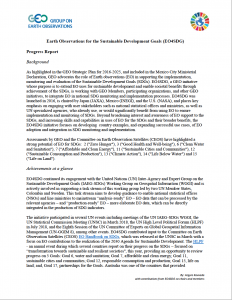 Background. As highlighted in the GEO Strategic Plan for 2016-2025, and included in the Mexico City Ministerial Declaration, GEO advocates the role of Earth observations (EO) in supporting the implementation, monitoring and evaluation of the Sustainable Development Goals (SDGs). EO4SDG, a GEO initiative whose purpose is to extend EO uses for sustainable development and enable societal benefits through achievement of the SDGs, is working with GEO Members, participating organizations, and other GEO initiatives, to integrate EO in national SDG monitoring and implementation processes. EO4SDG was launched in 2016, placing key emphasis on engaging with user stakeholders such as national statistical offices and ministries, as well as UN specialized agencies, who already use, or would significantly benefit from using EO to ensure implementation and monitoring of SDGs. Beyond broadening interest and awareness of EO support to the SDGs, and increasing skills and capabilities in uses of EO for the SDGs and their broader benefits, the EO4SDG initiative focuses on developing country examples, and expanding successful use cases, of EO adoption and integration in SDG monitoring and implementation.
Background. As highlighted in the GEO Strategic Plan for 2016-2025, and included in the Mexico City Ministerial Declaration, GEO advocates the role of Earth observations (EO) in supporting the implementation, monitoring and evaluation of the Sustainable Development Goals (SDGs). EO4SDG, a GEO initiative whose purpose is to extend EO uses for sustainable development and enable societal benefits through achievement of the SDGs, is working with GEO Members, participating organizations, and other GEO initiatives, to integrate EO in national SDG monitoring and implementation processes. EO4SDG was launched in 2016, placing key emphasis on engaging with user stakeholders such as national statistical offices and ministries, as well as UN specialized agencies, who already use, or would significantly benefit from using EO to ensure implementation and monitoring of SDGs. Beyond broadening interest and awareness of EO support to the SDGs, and increasing skills and capabilities in uses of EO for the SDGs and their broader benefits, the EO4SDG initiative focuses on developing country examples, and expanding successful use cases, of EO adoption and integration in SDG monitoring and implementation.
Assessments by GEO and the Committee on Earth Observation Satellites (CEOS) have highlighted a strong potential of EO for SDGs: 2 (“Zero Hunger”), 3 (“Good Health and Well-being”), 6 (“Clean Water and Sanitation”), 7 (“Affordable and Clean Energy”), 11 (“Sustainable Cities and Communities”), 12 (“Sustainable Consumption and Production”), 13 (“Climate Action”), 14 (“Life Below Water”) and 15 (“Life on Land”).
2017
Read our May 2017 Progress Report here:
Background. The evolving landscape of the 2030 Agenda for Sustainable Development requires the Group on Earth Observations (GEO) to engage with numerous UN activities, multi-stakeholder partnerships, emerging initiatives and voluntary commitments from all stakeholders devoted to support the SDG process. GEO is working closely with users and stakeholders such as: GEO Members and Participating Organizations; national statistical offices and line ministries; relevant international organizations, UN custodial agencies, the United Nations Statistical Division (UNSD), the UN Initiative on Global Geospatial Information Management (UN-GGIM), the United Nations Environment Program (UNEP), and the United Nations Convention to Combat Desertification (UNCCD), among others, to ensure comprehensive alignment and engagement with the SDG implementation process.
Currently, GEO supports the implementation of the 2030 Agenda through: i. implementation of the GEO Engagement Strategy, endorsed at GEO-XIII in 2016, which identifies the 2030 Agenda as one of the three priority areas for coordinated engagement across the entire GEO community; ii. the Earth Observations in Service of the 2030 Agenda for Sustainable Development (EO4SDGs) Initiative; and, iii. a Programme Board sub-group, which aims to ensure optimal alignment among the GEO Work Programme elements and the GEO priorities, including the SDGs…



